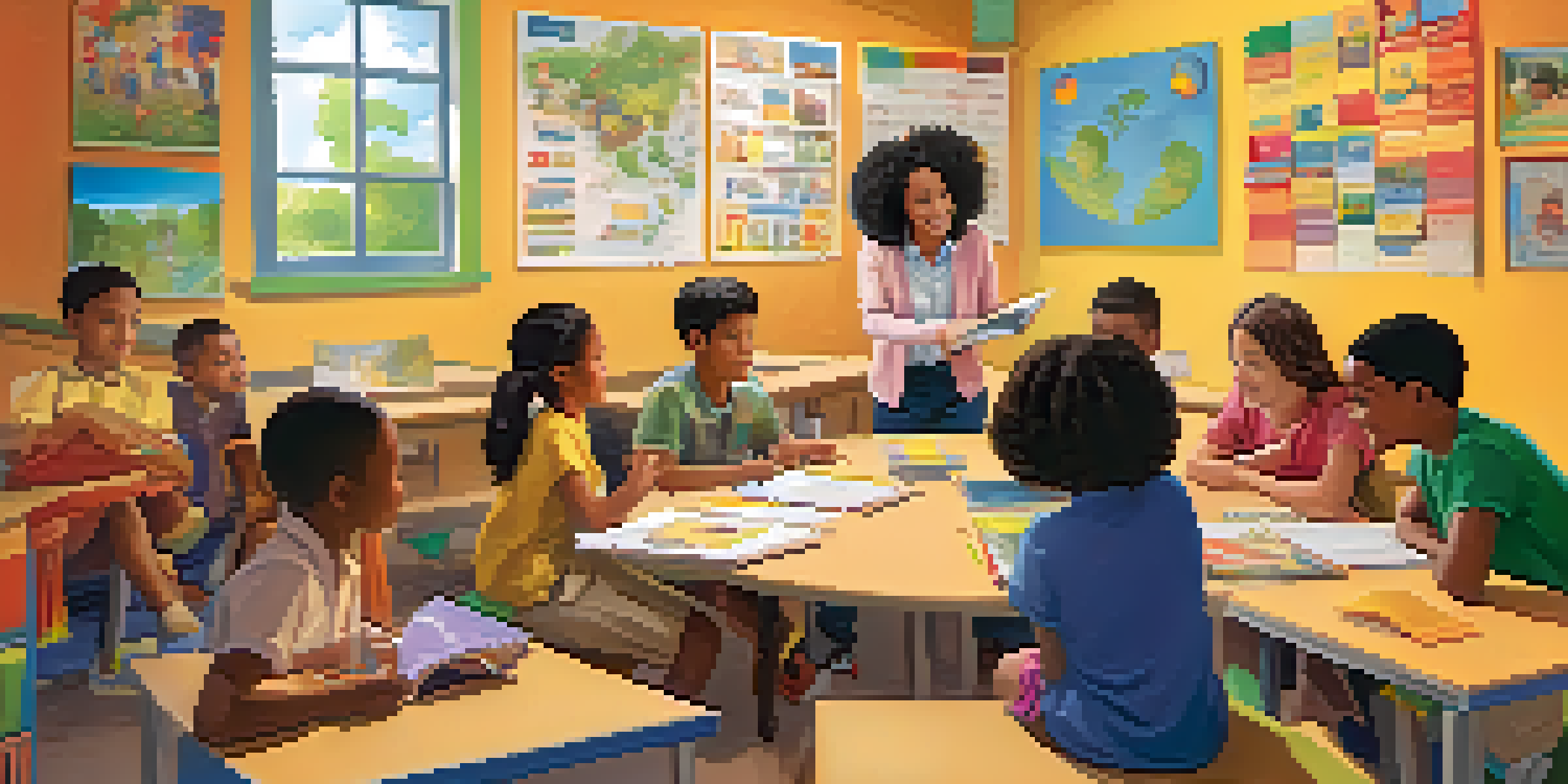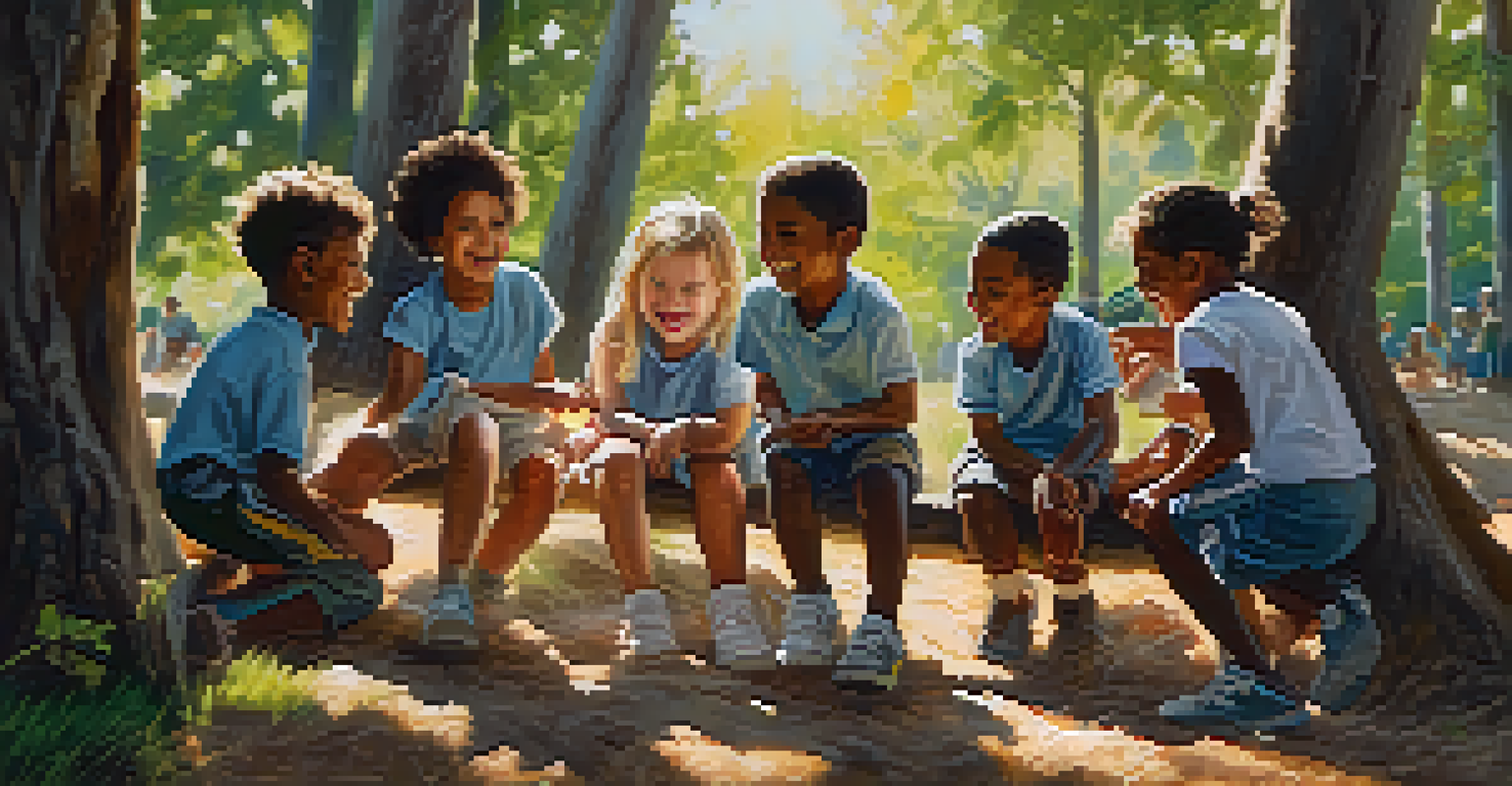The Influence of Peer Learning on Neurodevelopment

Understanding Peer Learning and Its Importance
Peer learning is a collaborative educational approach where individuals learn from each other. This method is especially relevant in settings like classrooms, where students engage in discussions and problem-solving together. The essence of peer learning lies in social interaction, allowing learners to share diverse perspectives and strategies.
The greatest gift is not being afraid to question.
One of the significant benefits of peer learning is that it fosters critical thinking and enhances communication skills. When children explain concepts to their peers, they reinforce their own understanding while developing the ability to articulate their thoughts. This back-and-forth exchange not only supports academic growth but also builds confidence in their abilities.
Moreover, peer learning creates a sense of community among students. When children collaborate, they feel more connected, making the learning environment more enjoyable and less intimidating. This social bond can be particularly beneficial, as it encourages students to take risks in their learning without the fear of judgment.
The Role of Social Interaction in Neurodevelopment
Social interaction is crucial for healthy brain development, especially in children. Engaging with peers stimulates various cognitive processes, such as problem-solving and emotional regulation. These interactions activate different brain regions, contributing to the formation of neural connections essential for learning.

Research has shown that positive social experiences can lead to increased levels of oxytocin, often referred to as the 'bonding hormone.' This hormone plays a vital role in reducing stress and enhancing feelings of trust and safety among peers. When children feel safe, they are more likely to engage deeply in learning activities, further promoting their cognitive development.
Benefits of Peer Learning
Peer learning fosters critical thinking, enhances communication skills, and builds a supportive community among students.
Additionally, the challenges presented during peer learning—like resolving conflicts or collaborating on projects—help children develop resilience and adaptability. These skills are not only important for academic success but also for navigating social situations throughout their lives.
Peer Learning and Cognitive Development
Cognitive development is a complex process that involves acquiring knowledge and skills over time. Peer learning can accelerate this process by providing opportunities for students to explore ideas together. When children work in groups, they can share resources, brainstorm solutions, and tackle challenging tasks collectively.
Alone we can do so little; together we can do so much.
One notable example is group projects, where students must collaborate to achieve a common goal. These projects require critical thinking, creativity, and effective communication, all of which are vital cognitive skills. As children navigate these group dynamics, they enhance their ability to think critically and approach problems from multiple angles.
Furthermore, peer learning can cater to diverse learning styles. By engaging with peers, children can experience different explanations and methods of understanding a concept. This variety helps solidify their knowledge and encourages them to adapt their learning strategies to better suit their needs.
Emotional and Social Skills Development Through Peer Learning
In addition to cognitive benefits, peer learning significantly contributes to emotional and social skill development. When children work together, they learn to navigate relationships, practice empathy, and develop effective communication skills. These experiences are essential for creating emotionally intelligent individuals.
For instance, when a child helps a peer who is struggling with a concept, they learn to empathize and understand different perspectives. This not only strengthens their bond but also fosters a culture of support and collaboration. Such emotional skills are crucial in building a positive learning environment.
Role in Cognitive Development
Collaborative learning accelerates cognitive development by encouraging idea exploration, critical thinking, and adaptability.
Moreover, peer learning helps children develop conflict resolution skills. Disagreements are natural in group settings, and working through these challenges teaches children how to negotiate, compromise, and find mutually beneficial solutions. These social skills are invaluable as they prepare children for future interactions in both academic and personal contexts.
The Impact of Peer Learning on Motivation
Motivation is a key driver of learning, and peer learning can significantly enhance it. When children see their peers engaged and excited about learning, they are often inspired to participate actively. This peer influence creates a dynamic atmosphere that fosters enthusiasm and curiosity.
Additionally, the accountability that comes with peer learning can motivate students to stay on task. When working in groups, students are more likely to contribute and complete their share of the work to support their peers. This sense of responsibility not only boosts motivation but also instills a collaborative spirit among learners.
Moreover, positive reinforcement from peers can enhance self-esteem. Compliments and encouragement from classmates can have a profound impact, making students feel valued and capable. This boost in confidence can motivate them to take on new challenges and continue exploring their interests.
Challenges of Peer Learning and Solutions
Despite its many benefits, peer learning is not without challenges. Group dynamics can sometimes lead to conflicts, unequal participation, or misunderstandings. These issues can hinder the learning process and may discourage some students from engaging fully.
To address these challenges, it’s essential to provide clear guidelines and support for group work. Educators can establish roles within groups to ensure all members contribute, fostering a sense of ownership and accountability. Additionally, teaching conflict resolution strategies can help students navigate disagreements constructively.
Challenges and Solutions
While peer learning has challenges like group conflicts, clear guidelines and structured activities can enhance its effectiveness.
Another effective solution is to incorporate structured activities that promote collaboration. Using tools like peer assessment or reflection sessions can help students provide feedback to one another, encouraging open communication and mutual respect. These strategies can enhance the overall effectiveness of peer learning.
Future Directions for Peer Learning Research
As we continue to understand the impact of peer learning on neurodevelopment, future research will be crucial. Investigating how different age groups and learning environments affect peer learning outcomes can provide valuable insights. This knowledge will help educators tailor approaches to maximize the benefits of collaboration.
Moreover, exploring the role of technology in facilitating peer learning can open new avenues for research. With the rise of online learning platforms, understanding how virtual peer interactions influence cognitive and emotional development is essential. This research could reshape how we approach education in a digital age.

Finally, examining the long-term effects of peer learning on social and emotional skills in adulthood could also be significant. Understanding these connections can help educators and parents support children in developing the necessary skills for successful future relationships and careers.